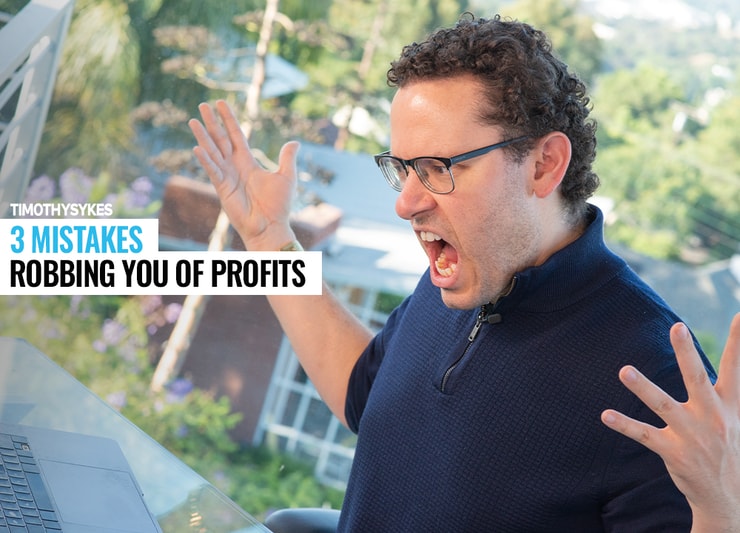There are two ways you can help yourself make more money as a trader.
#1 Develop your skills by discovering new strategies and then scale up on your best ideas
#2 Find out what’s losing you money and STOP DOING IT.
Now, #1 takes time and commitment. And believe me, if you ask any of my 20+ millionaire students if it’s worth it…they’ll all say YES!!!
But before you can focus on #1, you must stop the bleeding.
And that’s what I want to talk to you about today…how you can stop the bleeding…and start becoming a consistent and profitable trader.
The market is filled with opportunities right now…
But there are three mistakes I see traders constantly make.
I’ll show you how to avoid them.
Table of Contents
#1 Account Drainer: Not Adjusting To The Volatility

I like trading volatile stocks because that gives me the best chance to turn around a quick profit. However, there are strategies I utilize to strengthen my odds of making money.
But what if you don’t have those same skills? What do you do?
Trade Smaller or Don’t Put On Your Full Position At Once
It’s easy to slap on size when you are trading low-dollar stocks. But it’s also easy to get smoked if you don’t have a good entry.
Figuring out if your entry is on point takes time and experience.
That’s why you should trade small first. It doesn’t matter if that means 1 share or 100 to you. Scaling up is easy when you’re ready…just add another 0 to your share size.
But now, you want to get comfortable with the volatility and the swings in the stocks you’re playing.
Don’t get caught up in how much other people are making or let it bother you.
We’re all running a different race. It took my student, Mark Croock, almost a decade to reach $1 million in trading profits. But this year alone, he’s had multiple six-figure trading days!
If you haven’t mastered any strategies yet, you should certainly be trading small or paper trading.
#2 Account Drainer: Setting Stops On Volatile Stocks

Some of the most volatile stocks have super-wide spreads. And they tend to be thin. Using stops in situations in volatile stocks can be dangerous.
Why?
Because often, your order will get triggered and you’ll get filled way below your stop price. This happens much more with higher-priced stocks, but it can also happen with lower-priced ones.
Trading algo’s have a good sense of where traders put their stops. So they’ll violently send a stock down, wipe out all the stops, and then push the stock back up.
If it’s ever happened to you, then you know how painful and frustrating it can be.
Stop setting stops on volatile stocks.
Instead, manually exit the trade based on a level you want.
More Breaking News
- Datadog Battles Price Target Reductions Amid Growth Hopes
- SoFi Technologies Stock Surges: Q4 Wins Spark Analyst Upgrades
- Novo Nordisk’s Shares Surge as FDA Targets Illegal Drug Marketing
- Spotify’s Financial Surge: Poised for Growth Amid Upgrades and Strategic Moves
It may seem more difficult at first, but it will save you a lot of money from getting stopped out and filled at horrendous prices.
#3 Account Drainer: Adding To Losers

Imagine owning a restaurant and doing an audit on your menu. And finding out that certain dishes don’t sell well at all.
Would you buy more ingredients for those dishes that didn’t sell well?
Heck no.
But traders do it all the time when they add to losing positions.
Once you become experienced and consistently profitable, you’ll know when breaking the rules is okay.
However, the name of the game as a new trader is SURVIVAL. And adding to losers is a big-time mistake.
Furthermore, when you add to losers, and it doesn’t work out, it can send you down an emotional spiral. Often leading to revenge trading and other reckless behavior.
Stop adding shares to crappy trades you’re in.
I want you to make money and be successful.
Don’t add to losing positions. Your trading account and mind will thank you for it.
Bottom Line
Developing your skills as a trader takes hard work—like any worthwhile endeavor. As a new trader, your goal should be survival. That’s why you should first focus on stopping the bleeding.
Once you accomplish this goal…
Hit me up here, and I’ll show you how to develop your skills.


Leave a reply